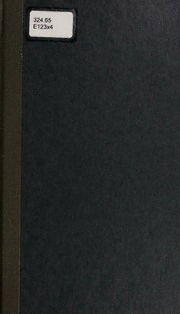
Early voting : early primary PDF
Preview Early voting : early primary
324.65 El23x4 fr^Or 188f: 324.65 E123x4 •ARLY VOTING EARLY PRIMARY LIBRARY U. OF URBANA-CHAMPAIGN I. UNIVERSITY OF ILLINOIS LIBRARY AT URBANA- CHAMPAIGN BOOKSTACKS ILLINOIS depository JAN 2 2 20(0 -.0.'' liW;'.. J at This pamphlet provides general information regarding new State laws that affect all eligible voters in Illinois. WHEN CAN PEOPLE VOTE? The 2010 Illinois primary election will be held on Feb. 2 - the earliest date in Illinois history - but eligible voters can cast a ballot in person at the office of an election authority or at an Early Voting Center from Monday, January 11, through Thursday, January 28. WHERE CAN PEOPLE VOTE? Election authorities in each county in the state will announce the locations of Early Voting Centers. People will be able tovote at certain locations on the weekend priorto the election and on the Martin Luther King Jr. holiday. In the less populous counties, the County Clerk’s office often is the early voting location. There will be approximately 200 Early Voting Centers throughout Chicago, suburban Cook County and populous counties in the metropolitan-Chicago area. DO MANY PEOPLE VOTE EARLY? The percentage of voters who cast ballots at an Early Voting Center has increased with every election. In the 2008 general election, 16% of the votes were cast at an Early Voting Center. Counting absentee voting and Grace Period voting, approximately 20% of the votes were cast before the polls opened on Election Day. WHY DO PEOPLE VOTE EARLY? Many people say they simply think voting early is more convenient. Others suggest they want to avoid risks on Election Day such as long lines at the polling place or bad weather. IS ABSENTEE VOTING STILL ALLOWED? Yes, and it has been made even easier. A new state law, Public Act 96-0533, permits a person to request and vote an absentee ballot without specifying a reason for being absent from the polling place on Election Day. It’s known as no-excuse absentee voting. Persons who desire an absentee ballot should contacttheir election authority foran application or more information. WHAT THE DEADLINE FOR IS REGISTERING TO VOTE? The traditional deadline for registering to vote is Jan. 5. However, Grace Period Registration is an extension of the deadline for registration. State law allows for the registration of voters and for a change of address at the office of an election authority, but it requires that a person participating in Grace Period Registration who wants to cast a ballot in the upcoming election to vote at that same office or by mail at the discretion of the election authority. People who register during the Grace Period are not eligible to vote at an Early Voting Center or at a polling place on Election Day. Grace Period Registration runs from January 6 to January 26, 2010. HOW CAN CHECKTO SEE AM REGISTI ERED? IF I Illinois residents can check to see if they are registered by going online at www.elections.il.aov. This new service is made available through the Illinois Voter Registration Service database, a requirement of the Help America VoteAct. WHAT ARE THE REQUIREMENTS ^TO REGISTER TO VOTE? A person must: • Be a citizen of the United States; • Be at least 18 years of age by Election Day; • Have been a resident of the precinct at least 30 days priorto Election Day. When registering to vote, two forms of identification are required - one must show the current address of the applicant. WHAT OFFICES ARE UP FOR ELECTION? Candidates for Governor, Lieutenant Governor, Attorney General, Secretary of State, Comptroller, Treasurer, U.S. Senate, Representatives in Congress, State Senators and Representatives in the General Assembly, certain county offices and judges will be nominated in the primary. Also, certain political party leaders will be elected in the primary. Some members of state central committees are elected, as are township committeemen in Cook County and precinct committeemen in the other 101 counties. IN A PRIMARY, WHY MUST A VOTER CHOOSE A POLITICAL PARTY? The primary election system is established by state law. A voter can vote for candidates of one party only. In some cases, nonpartisan candidates or referenda may be voted on in a primary, and if a voter does not want to declare a party affiliation, he or she may request a nonpartisan ballot only. THE STATE BOARD OF ELECTIONS A primary goal of the State Board of Elections is to help bring about greater understanding and participation in the electoral process. The State Board of Elections is an independent state agency charged with the responsibility of having general supervision over the administration of election laws of the State. The State Board works closelywith election authorities in all regions of the State. Elections are administered locally by the State’s 110 election authorities. These are the county clerks in 101 counties, one county election commission and eight municipal election commissions. As part of their many responsibilities, election authorities conduct local voter registration programs, train election judges, find polling places, prepare ballots, oversee Election Day activities and supervise the vote count at the local level For more information on early voting or otherelection laws and procedures, contact your election authority or visit the Board’s website: www.elections.il.gov UNIVERSITYOFILLINOIS-URBANA 12 108815975 State Board of Elections 1020 South Spring Street Springfield, Illinois 62704 217/782-4141 TDD 217/782-1518 100 West Randolph, Suite 14-100 Chicago, Illinois 60601 312/814-6440 TDD 312/814-6431 Printed by Authority of the State of Illinois www.elections.il.gov FY10-8-5000-10-09 UNIVERSITYOFILLINOIS-URBANA
